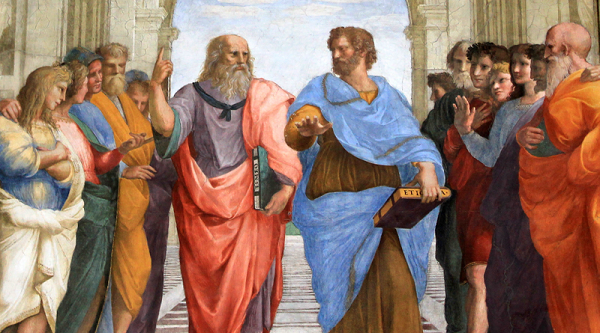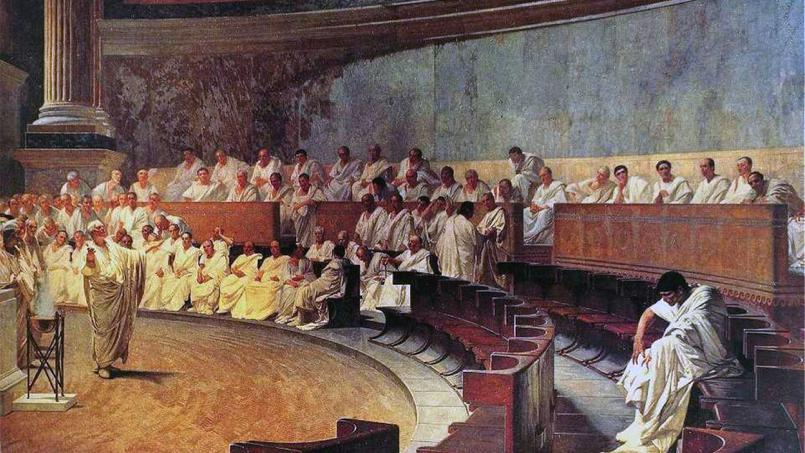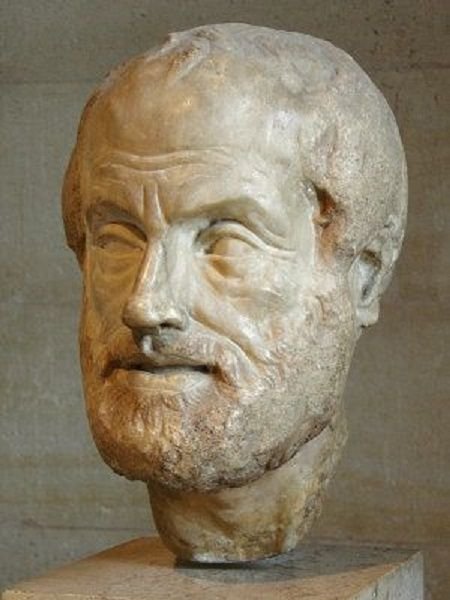The Ideal Ancient Greek Politics

Aristotle, Thucydides and Plutarch have long solved our "left" and "right" problems. In every ancient city-state there was a "folk" and "aristocratic" party. The folk usually consists of not the richest, but still possessing a cottage and a lame slave. Aristocratic - by incredible wealthy, but, as a rule, old money. There are, of course, exceptions: here and there among the people are indebted, impoverished or over-ambitious renegades from the aristocracy, and among the aristocrats sometimes old-fashioned old-fashioned nobbies are sometimes admitted. Typically, every decade or twenty years there is a coup, or at least an attempted coup in favor of the party that does not hold authority at the moment. In the midst of the two coup, the empowered party first tries to destroy the opposition, and after partial success or failure - to reassure her with small concessions and bribing some of her more conformist leaders.
From all this follows that each party has its privileges when it is in power: its members occupy state positions, have access to public procurement, receive better education, and so on. Therefore, in most ancient cities, domestic politics is the alternate exile and amnesty in changing democracy with aristocracy. Of course, democracy often degenerates into the lawless power of the crowd, growing into the tyrannical rule of a clever demagogue; and the aristocracy almost always goes into a corrupt oligarchy.
But consider the privileges. In managing the aristocratic or, conventionally, the "right" party, it is not necessary to establish genuine privileges: only educational attainment and military experience of taking up public positions is necessary. Education and experience are gained by belonging to the right families with old money. While in folk (in the ancient sense "folk", because today the use of this word has changed) or, also conditionally, the "left" party is necessarily required lists of suitable and inappropriate people. Here is the active privilege, the established, vowel privilege. This can easily be compared to the children of active fighters in communist regimes or to modern minority quotas in western, rather naïve, liberal societies. The purely meritocratic principle, according to which everyone can appear in a competition, but only the one who has dealt with the task is now an exclusion. From a "leftist" or a people's point of view, this principle is just a privilege, even cousinism (however paradoxical it may sound). That is why the "left" or folk, extreme democratic regimes and tyrants are at least temporarily forced to exclude the aristocracy from the race of honor and power. And they call this justice, equalization of chances. From a political point of view, those city-states that have introduced lot to the posts have handled most impartially; only that the lot often raises casual, incompetent people and can not be relied on. That is why the purely political decision is a failure, when some city work has to be done.

People's regimes, as a rule, fail. They easily change commanders and judges until it turns out that regular shift does not guarantee either the fulfillment of the tasks or the incompetence. As a result, the crowd gets tired of their own difficult freedom, and willy-nilly raises or agrees with a tyrant. The tyrant guarantees at least something like the stability of governance, but its impunity often leads to arbitrariness. If, however, he is more willing to his subjects, the tyrant may try to restore a more moderate, legitimate government entrusted to the aristocratic party, which surprises the crowd. If he is not well-meaning, the tyrant runs so cruelly that the crowd does not protect him when the aristocratic exiles return with the ideas of coup. And so the wheel turns once more.
The aristocratic regimes or constitutional, traditionalist republics do a little better. Their employees are usually more prepared for their tasks. They give a good example and are motivated to act both in their own interest and in the interest of the city. Their risk is from extreme antidemocracy, leading to corruption and cruelty to the population. When this happens, a new coup has invariably followed. The treatment for this is precisely the moderate, small concessions to the People's Party. An institution or master must take care of the interests of the crowd. A holiday, temple or deity is left to ordinary citizens as a source of joy and trust. Most of the time, the system of patronage has led individual members of the aristocratic regime to protect individuals or groups of the People's Party, dividing it into contented, peaceful and indisposed revolts. There is a second risk here - the aristocrats' personal ambition can set up angry bands against each other on the streets. That is why Plutarch argues that aristocratic and real statesmanship is the behavior that still takes care of the subjects and does not destroy, but ennobles, encourages and directs their energy for better purposes. For example, to participate in maritime expeditions, the establishment of new settlements and colonization, in military trips outside the state, in massive constructions that create city glory or work to enrich everyone. When competition for posts between aristocrats is manifested in various projects to increase the power of the state, supported by the work of protected groups of subjects, a period of relative inner peace and external grandeur occurs. Naturally, even this ideal system is not eternal. But it is what classical writers would like every city to aspire to. Mutually observing institutions and duplicate magistrates allow at least relative retention of ultimate personal ambitions within decent boundaries.

Aristotle
What worth emphasizing is a different look at the privileges. The People's, Democratic or Left Party usually creates a system of quota privileges and holds them because they believe that their lack is an unfair advantage for wealthy, experienced and educated but not always moral aristocrats. While the aristocratic "right" party assumes that the customary cults for experience, education, and opportunity to spend in a state position make man only acceptable for high office. As a result, aristocratic or "right" thinking develops objectivist - to achieve results and skills, even at the risk of dictates. And the people's, democratic or "left" - to equality at all costs (and to the exclusion of threateningly aristocrats with dangerously positive qualities) even at risk of failure.
Now to update the antique layout. The Greek and Roman examples show that Modernity has not created the division between left and right thinking, but only continues and deepens the problems of already existing urban societies. Not only do we serve antique terms, but we also practice the trampling of the internal political problems of ancient city-states. The continuing tension between capitals and provinces shows that even the largest modern unitary or even federal state is still concentrated in its center, in the narrow space between former city walls where national institutions have been assembled.
Antigamente tudo era melhor
This post received a 57% upvote from @morwhale team thanks to @godflesh! For more information, click here! . this is @originalworks . steem @steemprice BTC
$4338.46 USD/BTCVolume: 39004.71 BTC ($169220334.07 USD)Last Updated Thu Oct 5 21:36:33 2017The @OriginalWorks bot has determined this post by @godflesh to be original material and upvoted it!
To call @OriginalWorks, simply reply to any post with @originalworks or !originalworks in your message!
To enter this post into the daily RESTEEM contest, upvote this comment! The user with the most upvotes on their @OriginalWorks comment will win!
For more information, Click Here!
Special thanks to @reggaemuffin for being a supporter! Vote him as a witness to help make Steemit a better place!
muito bom meu amigo!
nice
The post is quite expository.
I've upvoted and resteemed this post dear @godflesh and i hop what can help you . Good luck!